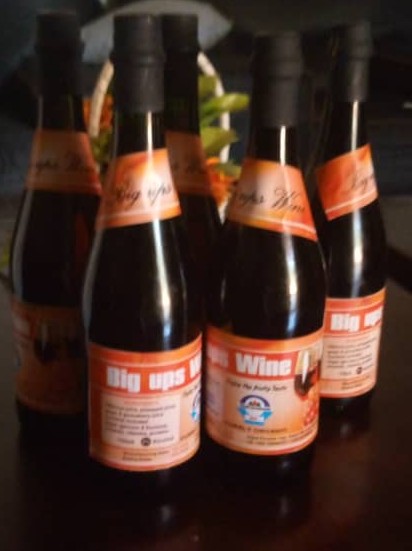Aporo says she developed a passion to be one of the wine producers in Uganda in 2015 when her then organization, CCI took her for business training.
Lira – January 3, 2022: Paska Aporo, 33, graduated with Bachelor’s Degree in Development Studies from Gulu University. As of now, she’s one of the enterprising young women who have started their enterprises.
Born in Alyek village, Lawino sub-county in Agago district, she opened up the first known wine ‘processing plant’ in the then Ojwina division, Lira municipality.
In 2007, after joining the University, she also volunteered with World Vision up to 2011. She would later be hired as a data clerk first with USAID and Samaritan Purse International.
Aporo also worked as the headmistress of Glory Secondary School in Kiryandongo district.
In 2013, she joined Children Chance International (CCI) an international NGO working with children in Lira district, as a social worker.
Passion for wine and innovation
Aporo says she developed a passion to be one of the wine producers in Uganda in 2015 when her then organization, CCI took her for business training. The training was funded by SNV, a Netherlands based organization.
The training, according to her was on social leadership and business management that attracted many of her peers.
“After the training, trainees were asked to send their business ideas to investors. Immediately, I started making cosmetic and liquid soap but later realized it was not much consumable.”
Aporo who wants to be the next powerful female industrialist soon turned her attention to wine production.
In March 2016, she produced 40 litres of ‘fine wine’ (not real name at the time) and fetched shs640, 000. Her starting capital was shs200, 000 only, she recalls.
“I turned to wine after learning the community around me wanted something to drink other than cosmetics or liquid soap. Because my brand (wine) is medicinal, it’s just good news for them,” Aporo narrates.
Currently, her sweat “Big Ups Wine” is widely consumed by customers of different walks of life and can be found in shops, supermarkets and outlets across the sub-region
Ingredients
Aporo spent her capital in buying some of the ingredients like hibiscus which she says is a great detoxifying mechanism in the body; gooseberry, grapes, pineapples and sugar are other ingredients.
The other ingredients except for sugar she says are “all purely organic and healthy”.
She also used the capital at hand at the time of starting for buying straws and jerry cans for production (fermentation) processes.
First branding and sales
“I started on the low because I was testing how it would hit the market and make it affordable for my local consumers. I packed them in used but safe mineral water bottles of,” on track Aporo said of her beginning, adding: “I was able to earn shs640, 000 out of 40ltrs produced.”

Talking with much passion, Aporo says she paid herself shs40, 000 as wage out of the monies accrued. The rest of the balance was saved for business expansion.
“From there, I opted for digital branding at shs150, 000. I also bought luscious bottles; seals and lids from one of the shops in Ggaba, Kampala.”
With years gone by, she has transcended. She now sells a carton (12 bottles) at shs240, 000 and those wrapped in 750ml bottles go at shs35, 000 each.
Workforce
At the start, she had skilled and empowered fifteen (15) women in different ventures like bar soap and liquid soap making, wine, among others.
“Currently, I am working with eight personnel: six are young women and two men in the wine business.”
Challenges at kickoff
“There existed numerous challenges from the onset because the training i got was purely theoretical not practical! Many local wine producers also made me sweat in order to infiltrate the market that was initially taken by them.”
Aporo got motivated and relieved when customers started demanding a lot because of the quality of the wine she produces.
Besides other challenges she highlighted above, expensive packaging materials, low production whilst high demand are affecting her business. One other big factor is a hi-tech production machine that she is yet to acquire
Savings to date
Calling the wine venture a profitable one, by 2016, she had saved shs6m. The savings have trebled, she says.
What annoys
“Most annoying are competitors who go ‘quantity’ not ‘quality’, making other producers lose market as consumers tend to opt for bigger things,” she expresses dissatisfaction at the business.
Triumphs
“I was working in an office but failed to buy myself a piece of land. Because of wine, I was able to get a piece. I have also improved on my income where they pay me and I pay myself,” she said with elation on her face.
Improving the lives of 15 women who work with her, she says is also another success.
Export and quantity
With a satisfying breakthrough thus far, Aporo intends to do exports to neighbouring countries like Kenya, Rwanda, Tanzania and South Sudan.
Asked why she is looking at regional markets, not Europe, she replies: “With several forums like trade shows where we have attended and showcased our products, many contacts were made; we have partners in countries like Kenya, Tanzania, and others.”
According to her, in 2016, her import was to start in the next six months when the production capacity was projected at 10 tons from the initial 1 ton. “Currently, however, we are producing 30 tons annually,” she says.
Build Up for Generations
Build Up for Generations is a local NGO she has founded. She says currently slots have been added to do value addition and bakery. Making reusable pads and general business training of women and girls’ mothers. “As a buildup, we look at economic empowerment of women and youth.”
Covid-19 pandemic and how it affected business headway
“Sales went down because of economic crisis whereby people could only afford foodstuffs. However, it gave us the opportunity to increase our production and standards of the wine maturity.”
Aporo also says currently they have wine of two years old and above: the ones we are selling now which has matured and taste very well.
Importantly, because of lockdowns and the inability to meet your customer face to face, she says, “We learned a lot, especially how to do online business and marketing. These were experiences during the new normal.”
Projections by 2025
She says a lot is in the pipeline. “We intend to increase production, increase marketing strategies, improve on branding that suits international markets and complete the UNBS registration.”
“By 2025 we look at becoming a brand name in the global markets.”
Advice to youth, women
“Everything is difficult but can be done. Change of attitude is the first step toward progress. Youth must tune their mindset and know what one can do, he or she can.”
Aporo further advises her peers that not what is called a ‘white-collar job’ is a job, asking them to find another definition of what a job is!
To women, she counsels: “All can be done and what a man can do, a woman can do better. It’s only us (women) steering Uganda into a middle income economy.”
Are you a young business owner? Is your story inspirational and do you want publicity? If yes, pitch to us: tndnews2012@gmail.com, newsroom@tndnewsug.com, patlis2000@yahoo.com WhatsApp: +256752169448 or call +256752630484

